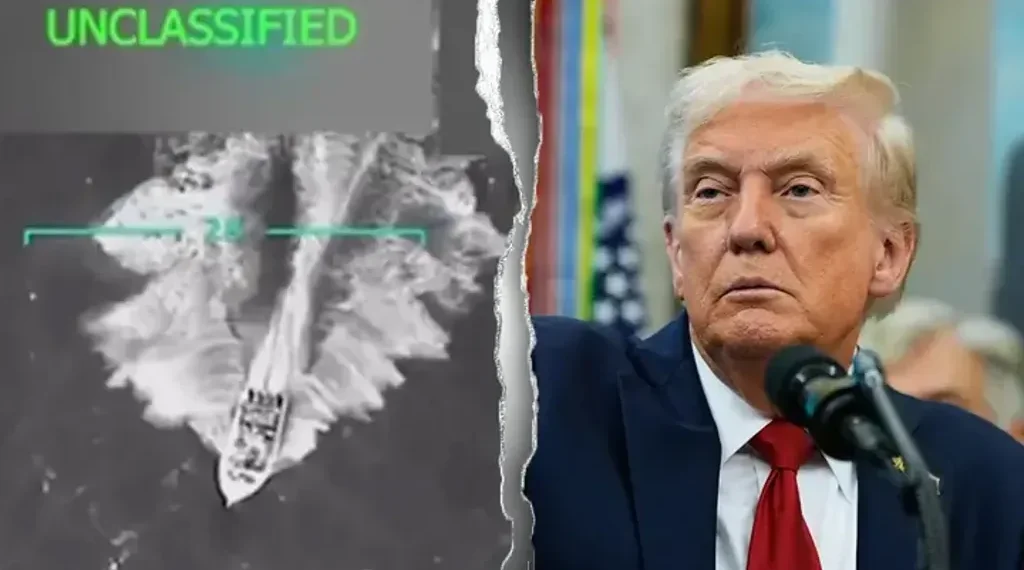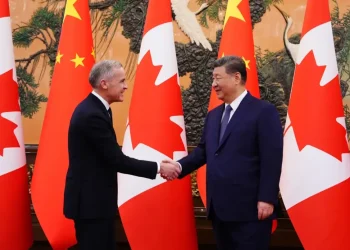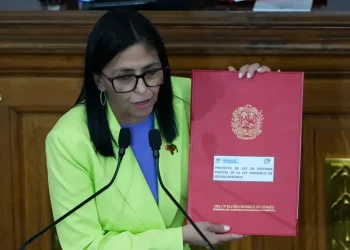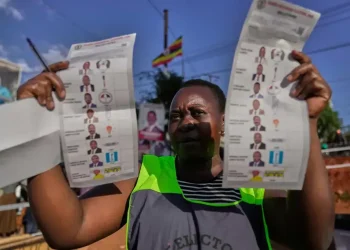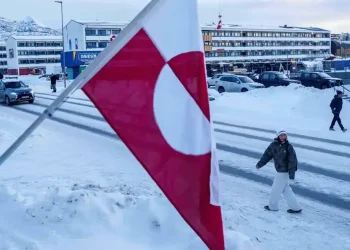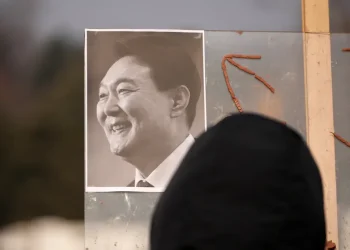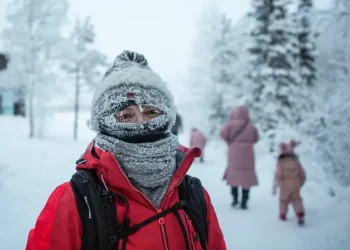Published: October 18, 2025, 22:15 EDT
Two survivors have been taken into U.S. military custody following a drone strike on a suspected drug-smuggling submarine in the Caribbean, marking the first known instance of survivors in the Trump administration’s intensified campaign against cartel vessels, officials said Friday.
According to U.S. Navy and defense officials cited by Fox News and The Associated Press, the strike—conducted Thursday—targeted a semi-submersible craft often used by transnational cartels to transport narcotics. The two survivors were rescued and transferred to an American warship, though their next destination remains undisclosed.
President Donald Trump confirmed the strike during a press conference at the White House on Friday, describing the vessel as “a drug-carrying submarine built specifically for the transportation of massive amounts of drugs.”
Escalation in Maritime Counter-Narcotics Campaign
The latest strike marks the sixth known drone operation against suspected drug-trafficking boats since the Trump administration launched its intensified maritime counter-narcotics campaign last month.
The U.S. has increasingly relied on unmanned aerial vehicles and naval assets to target what officials describe as “narco-subs”—low-profile vessels that sit just below the ocean surface to evade radar and surveillance.
The Thursday operation reportedly destroyed the vessel, leaving only two survivors, who were later retrieved by U.S. forces. It remains unclear whether they will face prosecution in the United States or be handed over to another jurisdiction.
Official Silence and Ongoing Investigation
Secretary of State Marco Rubio declined to confirm specific details about the survivors but said additional information would be released once the Pentagon completes its initial assessment.
Both the State Department and Department of War (formerly Defense) have been contacted for clarification on the legal process surrounding the detentions. Analysts say this case could set a precedent for how Washington handles survivors of targeted anti-cartel strikes in international waters.
Trump Confirms Strike, Warns Cartels
President Trump, speaking alongside Ukrainian President Volodymyr Zelensky at the White House, reaffirmed that the United States “will continue to strike vessels used to carry drugs toward American shores.”
“Venezuela is one of the biggest purveyors of narcotics,” Trump added, alleging that “criminals are being sent northward into our country.” The remarks follow a separate U.S. strike earlier in the week that reportedly killed six suspected smugglers aboard a vessel off the Venezuelan coast.
The administration has framed the operations as part of a broader “zero-tolerance” approach to narcotics trafficking, combining military action with stricter domestic penalties for trafficking offenses.
Task Force to Coordinate Caribbean Operations
War Secretary Pete Hegseth announced the creation of a new Joint Task Force within U.S. Southern Command to coordinate counter-narcotics operations across the Caribbean and Latin America.
“Our mission is to crush the cartels, stop the poison, and keep America safe,” Hegseth said in a statement posted on X (formerly Twitter). “The message is clear: if you traffic drugs toward our shores, we will stop you cold.”
The task force will reportedly integrate drone surveillance, naval interdiction, and intelligence-sharing with regional partners to disrupt maritime drug routes originating from South America.
Rising Tensions in Caribbean Waters
Regional analysts warn that the growing use of lethal force at sea could heighten diplomatic tensions with neighboring countries, particularly Venezuela, which has accused the U.S. of violating its maritime sovereignty.
Washington, however, maintains that all recent operations were conducted in international waters and in compliance with international law.
Human rights groups have urged the administration to provide transparency over targeting procedures, especially following reports of civilian casualties in similar strikes along the Pacific coast earlier this month.
Record Number of Maritime Strikes
The U.S. has carried out at least six confirmed strikes on cartel-linked vessels since September, according to officials. The operations have resulted in at least 28 fatalities, with Thursday’s incident marking the first case of survivors.
The campaign represents one of the largest uses of military power in U.S. counter-narcotics operations since the early 2000s, when joint efforts between the Navy and the Drug Enforcement Administration (DEA) targeted major cocaine routes across the Caribbean corridor.
Broader Anti-Cartel Strategy
Administration officials describe the current initiative as part of a “comprehensive counter-cartel strategy” that includes drone strikes, asset seizures, and expanded cooperation with regional security agencies.
Analysts say the renewed focus on military intervention in anti-drug policy underscores Washington’s frustration with decades of limited progress in curbing narcotics flows from Latin America.
“The U.S. is returning to a hard-power model in counter-narcotics—more reminiscent of the post-9/11 approach to global threats,” said retired Navy intelligence officer Carl Matheson, speaking to AP.
Unanswered Legal and Ethical Questions
The capture of survivors raises complex legal and ethical questions under international law. If the individuals are confirmed to be non-combatant traffickers, their detention without trial could prompt human rights scrutiny.
The administration has not yet disclosed whether the men will be tried in U.S. federal courts or repatriated. Legal experts suggest that their status could test the boundaries of U.S. military jurisdiction in anti-cartel operations.
A Message to Cartels and Allies
Despite mounting questions, U.S. officials insist that the strategy is working. Administration sources told Reuters that maritime drug flows toward the United States have dropped by more than 20 percent since the campaign began.
“The deterrence effect is real,” one senior defense official said. “Cartels are now hesitating to launch submersible vessels toward American waters.”
As Washington’s new task force expands operations, observers say Thursday’s drone strike—while controversial—illustrates how the Trump administration intends to sustain military pressure deep into the Caribbean.
This article was rewritten by JournosNews.com based on verified reporting from trusted sources. The content has been independently reviewed, fact-checked, and edited for accuracy, neutrality, tone, and global readability in accordance with Google News and AdSense standards.
All opinions, quotes, or statements from contributors, experts, or sourced organizations do not necessarily reflect the views of JournosNews.com. JournosNews.com maintains full editorial independence from any external funders, sponsors, or organizations.
Stay informed with JournosNews.com — your trusted source for verified global reporting and in-depth analysis. Follow us on Google News, BlueSky, and X for real-time updates.
